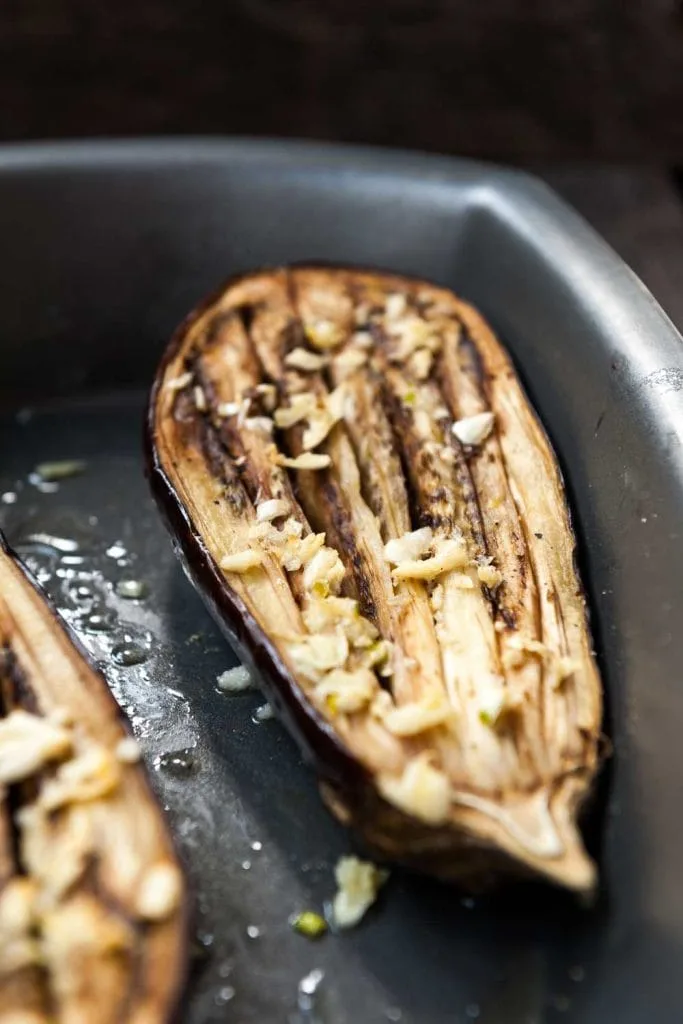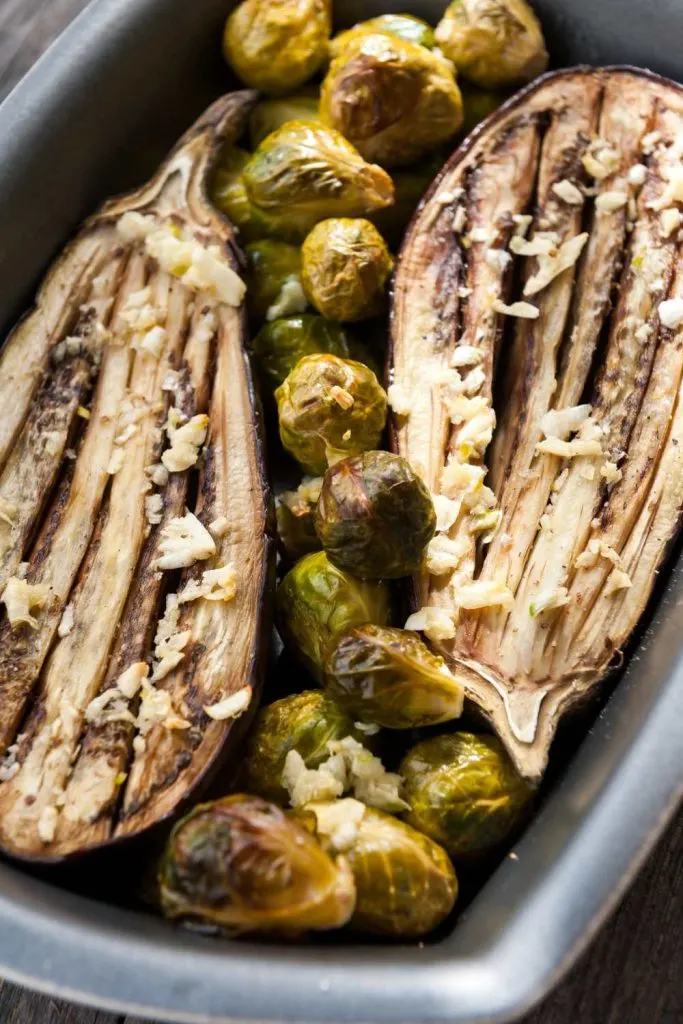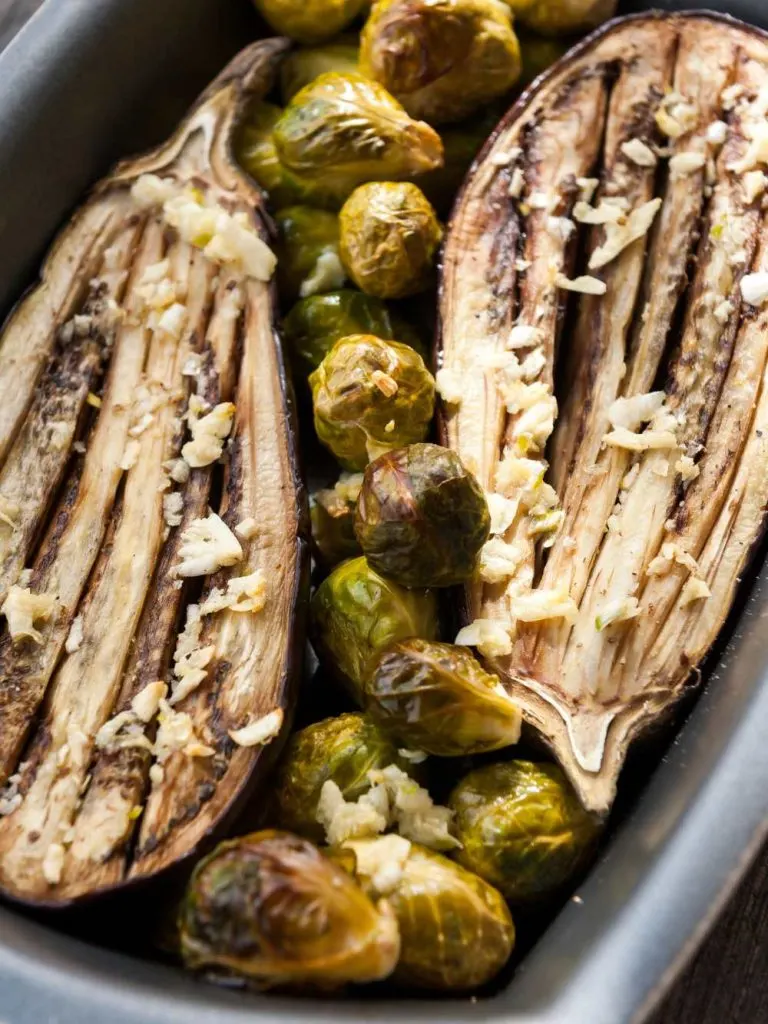This simple recipe for roasted Japanese eggplant is a nutritious and tasty dish that can be baked in the oven with a range of seasonings and spices, each of which contributes to the dish’s distinctive and delightful flavor.

Why You’ll Love This Recipe
- The eggplant in this recipe is roasted until soft and juicy, and then seasoned with a savory blend of garlic, ginger, and soy sauce for a dish that is as satisfying as it is delectable. You may spice up your supper with a new twist by including this dish.
- Making this roasted Japanese eggplant dish requires only a few simple ingredients and a short amount of time. The end product is a nutritious meal that tastes great.
- The roasted Japanese eggplant dish is highly nutritious since eggplants are already a rich source of vitamins and minerals and because the roasting method preserves those nutrients even more. The delicious spice boosts the flavor without adding excess calories or fat.
Roasted Japanese Eggplant Ingredients
- Eggplant. In terms of both taste and texture, eggplant is the dish’s hero ingredient. If you want the greatest taste, use a fresh eggplant.
- Olive Oil. The eggplant gets a lovely crunch from the roasting process, and the healthy oil provides a nice richness to the meal.
- Miso Paste. The eggplant gets an extra dose of salty, umami flavor from the miso paste. For the most robust flavor, miso paste that has not been pasteurized is recommended.
- Mirin. Because of the saltiness of the miso paste, the sweetness of this Japanese rice wine is just the right touch to round out the flavor.
- Soy Sauce. The saltiness and umami of the soy sauce elevate the meal. For the greatest taste, use premium soy sauce.
- Sesame Oil. The meal is elevated by the smokey, nutty taste of this oil. The flavor of roasted sesame oil is enhanced greatly.
- Sesame Seeds. The meal is finished with a crunchy topping of toasted sesame seeds.
Is Roasted Japanese Eggplant Healthy?
There is no doubt that Japanese roasted eggplant is good for you. Despite its rich flavor, low-calorie count, and high fiber content, Japanese eggplant is one of the healthiest vegetables available. It contains beneficial nutrients such as vitamins A and C, as well as a few of the B vitamins, potassium, and folate. As an added bonus, it possesses the antioxidant nasunin, which has been associated with several health advantages, including enhanced circulation and reduced cholesterol levels.
Which Oil Is Best For Roasting Japanese Eggplant?
If you’re going to roast Japanese eggplant, go for something neutral in flavor like olive oil or avocado oil. These oils have a higher proportion of beneficial monounsaturated fats than saturated fats. And because they contain so many anti-inflammatory and immune-enhancing antioxidants, these oils are a great choice.
How Do You Make The Roasted Japanese Eggplant Skin Crispy?
Make sure the eggplant is sliced evenly so that the skin may crisp up as you roast it. Another crucial step before baking eggplant slices is to coat them in oil. Sprinkle salt and pepper on all sides of the eggplant slices and coat them with oil. And last, crisp the eggplant in the oven at a high temperature for a few minutes.
How To Make Roasted Japanese Eggplant
- Preheat oven to 375 degrees Fahrenheit.
- Slice the eggplant to a thickness of about half an inch and arrange the slices in a single layer on a baking sheet.
- Sprinkle the eggplant with salt and pepper and drizzle with olive oil.
- Roast in an oven that has been preheated for 15 minutes.
- In the meantime, combine the ingredients for the miso paste dressing in a small bowl: soy sauce, mirin, sesame oil, and miso paste.
- After 15 minutes, take the eggplant out of the oven and spread it all over with the miso mixture.
- Roast the eggplant for an extra 15 minutes after you have returned it to the oven.
- After removing from the oven, sprinkle with sesame seeds that have been roasted.
- Serve and enjoy!

What To Serve With Roasted Japanese Eggplant?
- Brown Rice. The roasted eggplant brings out the nutty and slightly sweet flavor of the brown rice. It is a better choice than white rice since it contains complex carbs and adds more to the dish.
- Miso Soup. Japanese miso soup is flavorful and umami-rich because it contains fermented soybean paste, seaweed, and tofu.
- Pickled Ginger. Pickled ginger compliments the eggplant with its bright and tart flavor.
- Edamame. Edamame is a healthy addition to any meal since it contains both protein and fiber.
- Sushi. Traditional Japanese sushi is prepared using rice, seaweed, and a variety of fillings. It has a mild, refreshing taste that is perfect with grilled eggplant.
- Green Salad. To accompany roasted eggplant, a simple green salad works wonders. It’s a terrific way to increase the vegetable content of the dish while also adding a welcome crunch.
Recipe Variations
- Garlic Soy-Ginger Sauce Over Roasted Japanese Eggplant. Here, the eggplant slices are roasted with garlic before being topped with a sauce of soy sauce, ginger, and honey.
- Japanese Eggplant Roasted In A Miso-Maple Glaze. This variant features a sweet and savory miso-maple glaze.
- Japanese Eggplant Roasted In A Sesame-Soy Sauce. The sesame and soy dressing that comes with this variant is delicious, bringing together salty, sweet, and nutty notes.
- Japanese Eggplant Roasted In A Creamy Cashew Sauce. In this version, a cashew sauce that is both rich and nutty provides a delightful finish.
- Roasted Japanese Eggplant With Roasted Red Pepper Sauce. Roasted red pepper sauce adds sweetness, acidity, and a smokey undertone to this variant.
How To Store Roasted Japanese Eggplant?
- In The Fridge. Japanese eggplant may be roasted ahead of time and refrigerated in an airtight container. Maintaining the eggplant in a single layer will help preserve it clean and fresh for as long as possible. Make sure the eggplant is stored in a cool, dry place, away from any other perishables.
- In The Freezer. Japanese eggplant, after being roasted, may be stored in the freezer for up to three months. The eggplant needs to cool down entirely before it can be frozen. Then, place the eggplant cubes in a freezer-safe container or a zip-top bag. Compress the air out of the container and date it before storing it in the freezer.
- To Reheat. Japanese eggplant may be reheated in the oven at 375 degrees Fahrenheit. Bake the eggplant in a preheated oven at 400 degrees for 15 to 20 minutes, or until it is hot and crispy. The eggplant may be warmed in the microwave for 2–3 minutes, stirring once halfway through.
Roasted Japanese Eggplant Recipe Nutrition Facts
Amount Per Serving
- Calories 81
- Total Fat 0.5g
- Saturated Fat 0.1g
- Cholesterol 0mg
- Sodium 2mg
- Potassium 283mg
- Total Carbohydrate 20g
- Dietary Fiber 6g
- Sugars 7g
- Protein 2g
- Vitamin A 3%
- Vitamin C 3%
- Calcium 1%
- Iron 3%

Roasted Japanese Eggplant Recipe
Description
This simple recipe for roasted Japanese eggplant is a nutritious and tasty dish that can be baked in the oven with a range of seasonings and spices, each of which contributes to the dish’s distinctive and delightful flavor.
Ingredients
Instructions
- Preheat oven to 375 degrees Fahrenheit.
- Slice the eggplant to a thickness of about half an inch and arrange the slices in a single layer on a baking sheet.
- Sprinkle the eggplant with salt and pepper and drizzle with olive oil.
- Roast in an oven that has been preheated for 15 minutes.
- In the meantime, combine the ingredients for the miso paste dressing in a small bowl: soy sauce, mirin, sesame oil, and miso paste.
- After 15 minutes, take the eggplant out of the oven and spread it all over with the miso mixture.
- Roast the eggplant for an extra 15 minutes after you have returned it to the oven.
- After removing from the oven, sprinkle with sesame seeds that have been roasted.
- Serve and enjoy!
Notes
- Garlic Soy-Ginger Sauce Over Roasted Japanese Eggplant. Here, the eggplant slices are roasted with garlic before being topped with a sauce of soy sauce, ginger, and honey.
- Japanese Eggplant Roasted In A Miso-Maple Glaze. This variant features a sweet and savory miso-maple glaze.
- Japanese Eggplant Roasted In A Sesame-Soy Sauce. The sesame and soy dressing that comes with this variant is delicious, bringing together salty, sweet, and nutty notes.
- Japanese Eggplant Roasted In A Creamy Cashew Sauce. In this version, a cashew sauce that is both rich and nutty provides a delightful finish.
- Roasted Japanese Eggplant With Roasted Red Pepper Sauce. Roasted red pepper sauce adds sweetness, acidity, and a smokey undertone to this variant.
Servings 4
- Amount Per Serving
- Calories 81
- % Daily Value *
- Total Fat 0.5g1%
- Saturated Fat 0.1g1%
- Cholesterol 0mg
- Sodium 2mg1%
- Potassium 283mg9%
- Total Carbohydrate 20g7%
- Dietary Fiber 6g24%
- Sugars 7g
- Protein 2g4%
- Vitamin A 3 IU
- Vitamin C 3 mg
- Calcium 1 mg
- Iron 3 mg
* Percent Daily Values are based on a 2,000 calorie diet. Your daily value may be higher or lower depending on your calorie needs.

